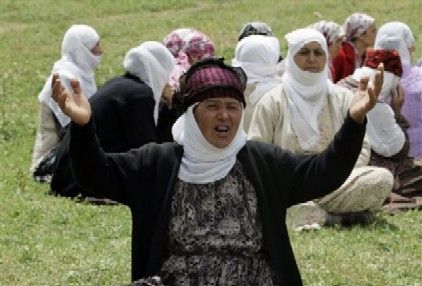Niyazi Dalyancı
“To put all the blame for the assault in Mardin on the village guards is not fair,” declared Brigadier Metin Guralp in his press briefing at the headquarters of the Turkish General Staff four days after armed men massacred 44 people, including children, pregnant women and men at prayer in a village of Turkey’s southeastern province.
The indiscriminate bloodbath shocked Turkey and made headline news in international media. The savagery of the massacre unparalleled even in the country’s southeastern part which has been the scene of fighting between Kurdish separatist PKK members and government forces for more than 30 years triggered a heated debate in Turkey on what might have incited people to commit such a ruthless act.
The carnage turned the spotlight on the “village guards,” some 60,000 men armed, trained and paid by the government to help the army in its struggle against the PKK. Simply because, both the victims and assailants of the massacre at the Bilge village were members of the clans where men belonged to this paramilitary organization and those who lost their lives were hit by weapons supplied by the government.
The attack took place when the victims had gathered at one of the 32 houses in the village of 150 for an engagement celebration. Dusk had just settled over the village and men in the house had taken their places behind the imam for evening prayers after eating their dinner served by the women. Shooting started at that moment. Masked men, armed with automatic guns, mostly Kalashnikovs sprayed the people in the house indiscriminately with bullets leaving 44 dead, 6 of them infants, 16 women, three of them pregnant and 22 men, including the imam. Three escaped with bullet injuries.
Within hours, the security forces seized 12 suspects with their weapons. All of them were relatives of the victims living in a village only 2 kilometers from Bilge.
Survivors told the authorities different stories about what might have incited the massacre. The reasons they gave vary from the wrath of a frustrated suitor of the engaged girl to an old blood feud and disputes over fish farming in a nearby stream. Whatever the reason was, the main question that faces Turkey presently is whether it was a wise move to arm men in the violence-prone area in order to combat what is officially termed as Kurdish terrorism.
The paramilitary organization, “village guards” was established in 1985 by legislation as a temporary force and in 1987 as PKK attacks increased it was transformed into a permanent branch. Members are paid a salary of 600 TL (300 Euros) and supplied with weapons and ammunition after a brief training by the authorities. According to the legislation passed by the Turkish parliament, they are supposed “to safeguard the lives, property and honor (meaning women) of their village” against the “terrorists.”
Military authorities defend the establishment of such a paramilitary organization claiming that since the members are locals they know the geography, language and social peculiarities of southeastern provinces and serve as guides and intelligence gatherers during major operations against the PKK.
However, according to a report by the Turkish Human Rights Association (IHD) village guards were responsible for burning down 38 villages, evicting forcibly inhabitants of 14 villages, 12 cases of sexual abuse, 22 abductions, 294 armed assaults, 70 cases of extortion, and 454 cases of torture. All these violations resulted in 132 deaths and 176 injuries. These figures only cover the period between 1990 and 2002.
An Interior Ministry document dated 1996 states that more than 23,000 village guards have been expelled for engaging in illegal activities and law breaking.
Opinions diverge
While the debate over the village guards continues, opinions within government ranks seem to diverge. Government spokesman Cemil Cicek stated that if necessary the village guard system might be scrapped.
“It is possible that there may be people within the system who commit misdeeds. Instead of making an assessment of the subject after an incident like this, we must evaluate it with all its aspects,” Deputy Prime Minister Cicek said.
“There are more than 50,000 people now who are spending efforts for the unity and integrity of the country, for public order. It is not fair to put all of them in one basket,” he added.
President Abdullah Gul, on the other hand, described the system of village guards as “a great organization that should be assessed by the state organs and experts.”
Bulent Arinc, the former speaker of the parliament who entered the new cabinet as a Deputy Prime Minister, said that in the beginning the village guards were established as a temporary force but later they became permanent. “We can eliminate the system by not employing new ones to replace those who retire,” said Arinc.
Abdurrahman Kurt, Justice and Development Party’s (AKP) deputy from Diyarbakir came strongly against the disbanding of village guards.
“You cannot tell them we have given you weapons and now we want them back. This is a social problem. You have to take into account the security of these people. You must think about the possibility that they might be victimized because of old disputes,” Kurt said.
“They go around like cowboys.”
Opposition Republican Peoples Party (CHP) deputy from Izmir, Ahmet Ersin argued that the village guards are also creating terror in the southeast.
“The interior minister says that it is not a terror incident. Are we suppose to understand only PKK when terror is mentioned. It is obvious that there is also a village guard terror in the area. The system of village guards should be questioned. Who are these people? Are they security officials or are they mercenaries? They are going around in the area like cowboys,” said Ersin.
MHP supports village guards
Rightwing Nationalist Action Party (MHP) expressed its support for the village guards and declared that the paramilitary organization should not be scrapped.
“If there is something that does not function properly in the system, it is the government’s duty to correct it. Village guards system is a useful practice contributing to the struggle against terror,” Mehmet Sandir, MHP’s parliamentary group spokesman said at a press conference.
Gen. Ilker Basbug, Turkey’s Chief of Staff, in a speech he delivered at the War Academy on April 14, three weeks before the massacre in Mardin had said that the presence of village guards on the side of the army in the fight against terror proves that the problem in the southeast is not an ethnic strife. “It is a very important sign that the terror organization does not enjoy the support of the local people,” said Basbug.
Basbug also said the the United States will create a similar organization in Afghanistan too.

